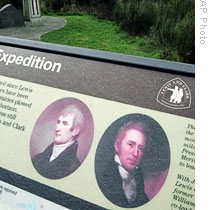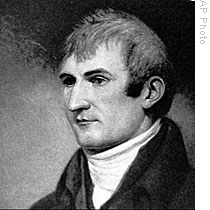Washington
09 July 2009
The descendants of one of the best-known U.S. explorers are trying to get to the bottom of a 200-year-old mystery surrounding his death. Relatives of Meriwether Lewis are making a new effort to exhume his body to finally determine whether he committed suicide, as is commonly believed, or whether he was murdered.
 |
| Portraits of Meriwether Lewis (L), William Clark (File) |
Suicide or murder?
But tragedy struck in 1809 when Lewis stopped at a rural inn called Grinder's Stand while on his way to visit President Thomas Jefferson in Washington. Professor Jim Starrs of George Washington University, an expert on the case, explains what happened next:
"During the first night that he was there, a shot was heard. Mrs. Grinder, being alone in her cabin-like rustic lodging did not respond to the shot that was heard," Starrs said. "Apparently there was a second shot that was heard, and the next thing she knew there was somebody beating at the door of her cabin. And it turns out it was Meriwether Lewis asking her for her assistance, which she refused for fear, apparently, of what might have happened to her if she had opened the door," he said.
In the morning the innkeeper found Lewis shot in the chest and the head. Since then, historians have argued over what happened. Was it a robbery gone wrong? A conspiracy leading all the way to President Jefferson? Or did the notoriously melancholy Lewis decide to take his own life?
Digging up the past
 |
| An undated portrait of explorer Meriwether Lewis |
"Now plenty of historians and authors have hypothesized about what caused his death, but nothing can be proven at this point, unless his remains are exhumed and examined," he said.
Members of the Lewis family insist they do not have an agenda to prove the explorer died one way or another. Lewis descendant Howell Lewis Bowen, says they just want to honor the memory of their great ancestor.
"Our family wants to put an end to the mystery hanging over how uncle Meriwether died. We deserve an answer, as do all Americans. Furthermore, we want to give uncle Meriwether a Christian burial - something he was denied in 1809," Bowen said.
The family has called on forensics expert Dr. Hugh Berryman of Middle Tennessee State University to examine what is left of Lewis' body to determine the cause of his death. Berryman says examining the bones of the deceased, even 200 years later, can be a lot like having an interview with that person. Part of the examination will focus on the direction of the gunshot wound to the head.
"If we look at a gunshot wound and it indicates side to side, it could be suicide, it could be homicide. Front to back, could be suicide, could be homicide. Back to front ?it would be hard to build a case for suicide in back to front," he said
He says he is hopeful that the bones will be in good enough shape after all these years to come to a conclusion.
But the family still faces many challenges in getting the closure that they want. The most persistent obstacle has been the federal government, which has refused their past requests to open the grave, for fear it will cause damage to the historic site.
The family is now pleading for the American public to help persuade the government to give them permission to exhume the body so that, in the words of descendant Tom McSwain, "history can be history, and not fiction."